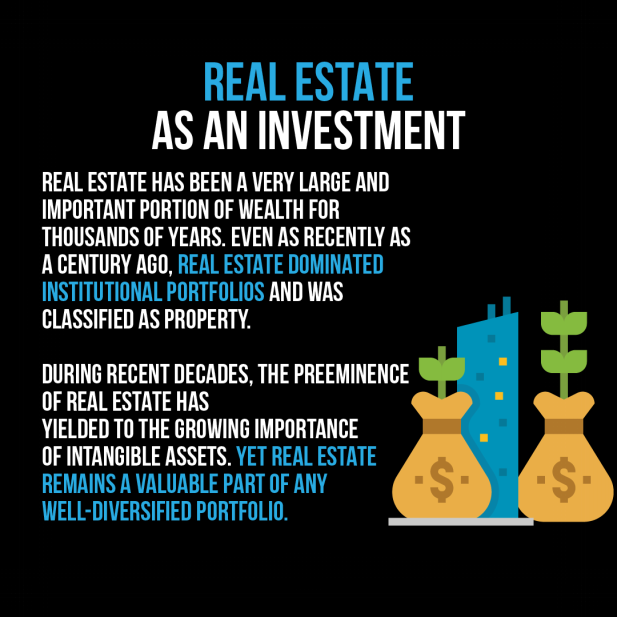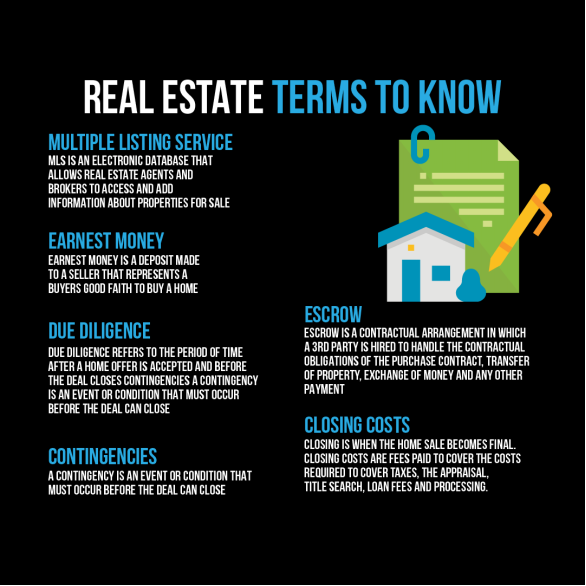Finding Real Estate Investment Opportunities
Viktige læringsmål:
Introduksjon: This section delves deep into the pivotal concepts of real estate investment, focusing on the significance and application of ROI, NPV, and IRR metrics. By acquainting yourself with these fundamental tools, you equip yourself for more calculated and insightful investment decisions in the realm of real estate.
- Understand the significance of ROI, NPV, and IRR in real estate investments and how these metrics interrelate.
- Learn to calculate these metrics and recognize their pivotal role in shaping the decision-making process for real estate investments.
- Familiarize oneself with the intricacies of cash flow projections, emphasizing the importance of accurately estimating rental income and expenses.
- Grasp the underlying principles of real estate cash flow analysis and its pivotal role in determining the viability and profitability of an investment.
Opportunities

Figur: This infographic outlines the initial steps one should take when venturing into real estate investing. It emphasizes the importance of formulating a plan, committing wholeheartedly, actively participating in the industry, familiarizing oneself with industry-specific terminology, grasping the core concepts, and observing successful investors. For those new to real estate, it’s crucial to take these steps seriously and seek mentorship or guidance when needed to ensure a successful investment journey.
Kilde: Tilpasset infografikk
A. Traditional methods for finding investment properties
Traditional methods for finding real estate investment properties are time-tested approaches that have been utilized by investors for decades. Here are some of the most common traditional methods:

Figur: The infographic provides a list of methods to discover real estate investment opportunities. It suggests tactics such as “Driving for Dollars,” utilizing the Multiple Listing Service, outbound marketing, browsing Craigslist, leveraging word of mouth, checking newspapers, and attending auctions. For aspiring real estate investors, these avenues can be invaluable in finding potential properties and deals.
Kilde: Tilpasset infografikk
Remember that due diligence is crucial when considering any investment opportunity. Evaluate each property carefully to ensure it aligns with your investment goals and risk tolerance.
- Real estate agents: Partnering with a knowledgeable and experienced real estate agent who specializes in investment properties can help you identify potential deals in your target market.
- Word of mouth: Networking with family, friends, and colleagues can help you uncover off-market deals and potential investment opportunities.
- Real estate clubs and associations: Joining local real estate clubs or associations can help you network with other investors and professionals, and gain access to investment opportunities.
- Classified ads: Check local newspapers or online classified ad websites such as Craigslist for real estate listings in your target area.
- Driving for dollars: Physically scouting neighborhoods in search of distressed properties, vacant homes, or houses undergoing renovations can help you identify investment opportunities.
- Foreclosures and bank-owned properties: Researching foreclosed properties or REOs (real estate owned properties) can be a source of below-market-value investments.
- Auctions: Attend real estate auctions, such as sheriff’s sales, estate sales, or tax lien auctions to find potentially undervalued properties.
- Direct mail marketing: Sending targeted mailers to property owners in your target area can generate leads and help you find motivated sellers.
- Public records: Research property ownership, tax liens, and other public records to identify investment opportunities.
- Real estate wholesalers: Partner with real estate wholesalers who specialize in finding and negotiating off-market deals for investors.
- Referrals from professionals: Build relationships with professionals like attorneys, accountants, and contractors who may have clients or contacts with investment property opportunities.
Figur: The infographic highlights the significance of real estate as an investment avenue. It emphasizes that real estate has been a dominant wealth asset for thousands of years and was once the primary component of institutional portfolios. However, in recent decades, intangible assets have gained prominence, but real estate still remains a crucial part of a diversified investment portfolio. Investors should consider the historical importance of real estate and its enduring value when diversifying their assets.
Kilde: Tilpasset infografikk

B. Off-market and non-traditional methods for finding properties

Figurtittel: Golden Toy House Under Magnifying Glass
Kilde: iStock:
Off-market and non-traditional methods for finding properties are alternative ways to locate real estate opportunities that aren’t commonly advertised or listed on traditional real estate marketplaces. These methods require a more proactive approach to finding potential properties and often involve networking and creative thinking.
A. Networking: One of the most effective ways to find off-market properties is through networking. This involves building relationships with people in the real estate industry, such as real estate agents, property managers, contractors, and other investors. By staying connected with these individuals, you can learn about potential opportunities that aren’t yet listed on the market. You can also leverage their expertise and experience to help you evaluate properties and make informed decisions.
B. Direct Mail Campaigns: Another way to find off-market properties is through direct mail campaigns. This involves sending letters, postcards, or other marketing materials to property owners in specific areas or neighborhoods. These materials can include an introduction to your company, your investment criteria, and an offer to purchase their property. By targeting owners who may be motivated to sell, you can increase your chances of finding a good deal.
C. Online Marketplaces: While traditional real estate marketplaces like Zillow and Redfin may not have every property listed, they still provide a wealth of information that can be used to find off-market properties. By using the advanced search filters and regularly checking the platform for new listings, you can find properties that meet your criteria but aren’t yet widely advertised.
D. Public Records: Another non-traditional method for finding properties is by searching public records. These records can include tax assessments, property transfers, and foreclosure filings. By researching these records, you can identify properties that may be in distress or have motivated sellers. From there, you can reach out to the owners directly or work with a real estate agent to make an offer.
E. Auctions: Finally, auctions can be an effective way to find off-market properties. These can include traditional in-person auctions or online auctions. While the competition can be fierce at auctions, the potential savings can be significant. You’ll need to do your research and have a good understanding of the local real estate market to make a competitive bid.
In conclusion, off-market and non-traditional methods for finding properties require a more proactive approach to locating real estate opportunities. By leveraging networking, direct mail campaigns, online marketplaces, public records, and auctions, you can increase your chances of finding a good deal. It’s important to have a clear investment strategy and work with experienced professionals to help you evaluate properties and make informed decisions.
C. Working with real estate agents and wholesalers

Figurtittel: Real Estate Agent Showcasing a Property
Kilde: iStock
I. Benefits of working with professionals
Access to Properties: Real estate agents and wholesalers have access to a wide range of properties that may not be easily accessible to the general public. They have access to exclusive listings and off-market opportunities, which can help you find a property that meets your specific needs.
Expertise and Experience: Real estate professionals have extensive knowledge and experience in the industry. They can help you navigate complex transactions and provide valuable insights on market trends and property values. They can also help you negotiate deals and avoid common pitfalls.
Tidsbesparende: Working with real estate professionals can save you time and effort. They can handle the entire process of finding and purchasing a property, from conducting market research and identifying potential properties to negotiating deals and closing transactions.
Networking: Real estate agents and wholesalers have extensive networks of contacts in the industry, including other agents, contractors, and service providers. This network can provide you with access to valuable resources and connections that can help you with your real estate investment goals.
II. Strategies for finding trustworthy agents and wholesalers
Referrals: Ask for referrals from friends, family members, or colleagues who have experience working with real estate professionals. Personal referrals can provide you with honest and reliable feedback about their experience with an agent or wholesaler.
Online Reviews: Check online reviews and ratings of real estate agents and wholesalers to get an idea of their reputation in the industry. Websites like Zillow, Yelp, and Google My Business can provide you with valuable insights from previous clients.
Professional Organizations: Look for agents and wholesalers who are members of professional organizations, such as the National Association of Realtors (NAR) or local real estate boards. These organizations have strict ethical standards and guidelines that their members must follow.
Interview Prospective Agents and Wholesalers: Before working with an agent or wholesaler, schedule a meeting or phone call to ask them about their experience, expertise, and approach to real estate transactions. This can help you determine if they are the right fit for your investment goals.
Check License and Credentials: Verify that the agent or wholesaler you are considering is properly licensed and has any required credentials, such as a real estate license or broker’s license. You can check their credentials online or contact the appropriate state agency to confirm their license.
In conclusion, working with real estate agents and wholesalers can provide many benefits to real estate investors, including access to exclusive properties, expertise and experience, time-saving, and networking. To find trustworthy agents and wholesalers, it’s important to use strategies such as referrals, online reviews, professional organizations, interviews, and verifying their license and credentials.
D. Due Diligence and Property Inspections

Figurtittel: Customer and Architect Evaluating an Under-Construction Site
Kilde: iStock
I. Importance of due diligence and property inspections
Due diligence and property inspections are critical components of the real estate investment process. They involve a comprehensive review and analysis of a property to ensure it meets your investment goals and to identify potential risks or issues. By conducting due diligence and property inspections, you can make informed decisions about the property, minimize potential risks, and negotiate a fair price. It’s essential to work with experienced professionals, such as inspectors or title companies, to ensure a thorough due diligence and property inspection process.
II. Assessing property condition and repair needs
Hire a Professional Inspector: Engage a professional inspector to conduct a comprehensive inspection of the property. They can identify issues with the property’s structure, systems, and components, such as electrical, plumbing, and HVAC systems.
Conduct a Visual Inspection: Personally walk through the property and visually inspect the interior and exterior. Look for signs of damage or wear and tear, such as wall or foundation cracks, water stains, or leaks.
Obtain Repair Estimates: If the inspection reveals necessary repairs, obtain estimates from contractors or service providers to determine repair costs. This information can help you negotiate with the seller and budget for repairs.
III. Evaluating rental income potential and market demand
Conduct Market Research: Investigate the local rental market to determine rental property demand and average rental rates. This research can help you determine if the property is priced competitively and if there’s demand for rental properties in the area.
Evaluate Property Features: Assess the property’s features, such as location, size, and amenities, to determine rental income potential. Properties in desirable areas or with attractive features may command higher rental rates.
Review Existing Leases: If the property has existing tenants, review their lease agreements to determine rental rates and lease terms. This information can help you ascertain if the property generates adequate rental income and if there’s potential for rental increases.
IV. Conducting title searches and researching property history
Hire a Title Company: Engage a title company to conduct a title search and provide title insurance. This service can help protect you from title defects or liens that may arise after purchase.
Review Property Records: Investigate the property’s ownership history, including transfers or sales, to determine if any legal or financial issues may affect the property’s value or your ownership rights.
Check for Liens and Encumbrances: Identify any liens or encumbrances on the property, such as mortgages, judgments, or tax liens, that may affect your ability to own or use the property.
In conclusion, due diligence and property inspections are vital steps in the real estate investment process. By assessing the property’s condition and repair needs, evaluating rental income potential and market demand, and conducting title searches and researching property history, you can make informed decisions about the property and minimize potential risks. Consider hiring professionals, such as inspectors or title companies, to assist with the due diligence process and provide valuable insights and expertise.
E. Financing Real Estate Investments
Figur: The infographic provides a comprehensive list of essential real estate terms that every investor or homebuyer should be familiar with. It covers terms such as “Multiple Listing Service,” which is an electronic database for property listings, “Earnest Money” representing a buyer’s commitment, “Due Diligence” referring to the period post-offer acceptance, “Contingencies” which are conditions for deal closure, “Escrow” detailing the contractual arrangement, and “Closing Costs” which encompass various fees associated with finalizing a home sale. Familiarity with these terms can significantly aid in understanding and navigating the real estate market more efficiently.
Kilde: Tilpasset infografikk

Financing options for real estate investments
Financing options for real estate investments refer to the various ways investors can secure funds to purchase or develop a property. These options include both traditional and non-traditional methods, with their own advantages and disadvantages. Some common financing options include:
- Cash: Using personal funds to purchase a property outright or make a substantial down payment. This option eliminates the need for debt or interest payments but requires significant upfront costs.
- Conventional Loans: Mortgages not backed by the government, obtained from banks or other lenders, with the property serving as collateral. Qualification typically requires a good credit score, a down payment of at least 20%, and a stable income.
- FHA Loans: Government-backed mortgages insured by the Federal Housing Administration, designed for first-time homebuyers and low-income individuals. Investors can also use FHA loans for multi-unit properties if they plan to occupy one of the units.
- Hard Money Loans: Short-term loans used by investors needing quick access to capital, with high-interest rates, typically between 10% and 15%. Hard money lenders focus more on the property’s value than the investor’s credit score.
- Private Money Loans: Similar to hard money loans, but obtained from individuals or groups rather than traditional lenders. Private money loans can offer more flexibility, with terms negotiated between the investor and lender.
- Home Equity Loans: Loans that allow investors to borrow against the equity built up in their primary residence. This option can be less expensive than other loans since the interest is tax-deductible.
- Seller Financing: Financing provided by the seller of a property, which can be useful when other options are unavailable or when the seller wants to make the property more attractive to potential buyers.
In conclusion, financing options for real estate investments can vary widely depending on an investor’s goals and financial situation. Each option has its advantages and disadvantages, so careful consideration is needed before making a decision. It’s important to work with a qualified financial advisor or real estate agent to help determine the best financing option for your specific needs.
F. How to Qualify for a Mortgage

Figurtittel: Mortgage Application Process
Kilde: iStock
Steps to qualify for a mortgage for real estate investment
Qualifying for a mortgage for real estate investment can be challenging, but by following these steps, investors can increase their chances of success:
Improve Credit Score: Work to improve your credit score by paying bills on time, keeping credit utilization low, and disputing any errors on your credit report. Aim for a credit score of at least 620, although some lenders may require higher scores.
Save for a Down Payment: Save at least 20% of the purchase price for a down payment to avoid paying private mortgage insurance (PMI) and to meet higher down payment requirements for investment properties.
Maintain Stable Income: Ensure you have a stable job or other sources of income, and avoid making significant career changes before applying for a mortgage, as lenders will want to see a steady income.
Reduce Debt-to-Income Ratio: Aim to keep your DTI below 43% by paying off debt and avoiding taking on new debt before applying for a mortgage. Lenders use the DTI ratio to assess your ability to make mortgage payments.
Prepare Documentation: Be ready to provide documentation of your income, employment history, tax returns, and bank statements. Lenders will also require a property appraisal and a title search.
Shop Around for Lenders: Different lenders may have varying requirements and interest rates for investment property mortgages. Shop around to find a lender that offers favorable terms and interest rates.
By following these steps, investors can improve their chances of qualifying for a mortgage for real estate investment. It’s essential to plan and prepare carefully to meet lenders’ requirements and secure financing for your investment property.
Viktige takeaways:
Avsluttende uttalelse: The bedrock of insightful real estate investment decisions lies in a profound understanding of ROI, NPV, and IRR. With this section as your guide, you are better equipped to navigate the complex world of real estate, using these metrics to assess profitability, forecast cash flows, and ultimately, select investments with greater potential and minimized risks.
- ROI, NPV, and IRR emerge as indispensable tools in the toolbox of every real estate investor, offering clarity on profitability and the appeal of an investment.
- The nuances of ROI provide a direct percentage return; however, NPV and IRR elevate the decision-making process by integrating the time value of money.
- Zilculator’s Excel template is a beacon for simplifying NPV calculations, setting the stage for more data-driven investment choices.
- IRR stands out as a metric, indispensable for contrasting potential returns of diverse real estate investments, especially when considering varied cash flows over time.
- The precision in estimating potential rental income and consequent expenses is a cornerstone for visualizing prospective gains or setbacks from a real estate venture.
- The art and science of cash flow analysis is paramount, ensuring an investor is not merely buying a property but a sustainable and rewarding income stream.
- Metrics such as the Operating Expense Ratio (OER) and Net Operating Income (NOI) shed light on a property’s operational efficacy and potential profit margins.
- The advent of cutting-edge financial tools and software has demystified intricate calculations, granting investors the luxury of time and focus on strategic decision-making.

